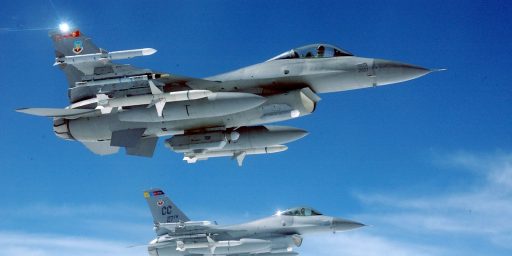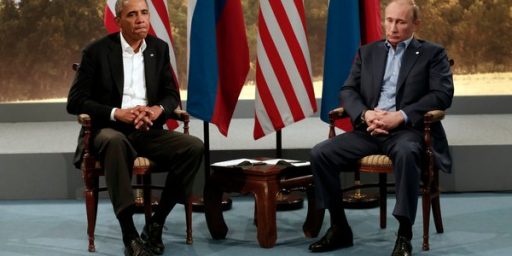The Magnitude of the Air War Against ISIS
The U.S. Air Campaign Against ISIS Is Much Bigger Than You Think
The Lexington Institute’s Daniel Goure explains, “The U.S. Air Campaign Against ISIS Is Much Bigger Than You Think.” The key ‘graphs:
What goes underreported and, hence, underappreciated, is the magnitude of the overall air operation being conducted in support of or in addition to the actual air strikes against targets on the ground. Simply put, behind every successful air strike is a massive supporting infrastructure of aircraft, ground operations and planning activities. Air strikes are not conducted in isolation. Every strike package consists not only of bomb-carrying aircraft but others providing the protection, electronic warfare support, aerial refueling, battle space management and intelligence. The 240 strikes in Iraq and Syria were supported by some 3,800 aircraft sorties, 1,700 tanker flights and over 700 ISR sorties. There have also been thousands of flights by transport aircraft, C-17s and C-130s making up the largest fraction, providing humanitarian relief but also moving personnel and essential supplies into the region.
Behind all these aircraft stands the supporting personnel and infrastructure necessary to any air operation. These range from ground crews and air traffic controllers to maintainers, armorers and intel personnel. Then there are the people in the air operations center who put together the air tasking order that details all the air activities for a 24-hour period. There are more people and more complexity when it is a joint and coalition operation.
Doing the math, this means there have been around 20 supporting sorties for each strike conducted. This is in a fairly benign environment. Even the use of the F-22 stealth fighter in Syria was based largely on taking advantage of its extraordinarily capable sensor suite and not its defense-avoidance capabilities. If this had been what air strategists call a contested environment, the number of supporting sorties would have been much higher. Against a serious adversary with advanced air defenses, there would likely be a protracted effort to roll back the defenses that would require specialized platforms and weapons intended for the mission of suppressing enemy air defenses.
For more than two decades now, we’ve been using air power so routinely, almost exclusively in uncontested air space, that we lose sight of the enormity of the operations. The Libya campaign, which was sold as a mere supporting operation for the United States, was actually enormously complex and large. To the extent our foes have serious air defenses at all, we easily take them out in the initial hours of the campaign. After that, it’s largely shooting fish in a barrel.
Our pilots and crews are still in mortal danger, of course, but really no more so than they are in training. Flying—and military maneuvers generally—are inherently dangerous. But the “no ground troops” policy is so seductive precisely because we’re not going to take heavy casualties from the air.

![Alabama Utility Crews Turned Away From Sandy Relief: Not Union [UPDATE: Not Exactly]](https://otb.cachefly.net/wp-content/uploads/2018/03/natural-disaster-tornado-volcano-fire-hurricane-earthquake-886x464-512x256.jpg)




If you have a few minutes take a look at Joint Publication 3-30, Command and Control of Joint Air Operations. It’s not that long–only 123 pages–but it lays out the command and control side of getting airstrikes on targets. It’s an interesting read.
Here is some ancient history:
In 2006, the US had complete control of the air over Iraq and around 140,000 soldiers on the ground. This was insufficient, and we instituted the “surge” in 2007 adding another 20,000. This clamped down on that Sunni insurgency for six years.
The idea that air power alone can contain the Sunni insurgency was shown to fail in 2006.
My guess is that it won’t work this time either.
I love shiny airplanes and videogame fighting, but real wars are different.
@Slugger: I love airstrikes. They’re awesome. I spent the bulk of my Air Force career as a Tactical Air Control Party specialist. My purpose in life was to ensure bombs on target.
And I agree with you 100%. Airstrikes are a force multiplier, a tool in the military’s toolbox, but they are not–and should not–be the primary means of warfighting. The only way to push an enemy off a piece of land and occupy it is with a ground force. Airstrikes can certainly be a big part of achieving the objective, but as the primary means they won’t get it done.
This is all fascinating, but we’re talking about war here. There’s no “A for effort” or prizes for second place. It doesn’t matter how hard you try or how much you spend — if you don’t win, then it’s all wasted effort.
@Jenos Idanian #13:
How do you define victory, and how do we achieve it without paying a larger price than we have already paid in Iraq?
We we screwed the moment the first “shock & awe” bomb hit the ground.
@anjin-san: I define “victory” by going to a dictionary web site and cutting and pasting.
‘Cuz you’re not worth any more effort than that. You’ve repeatedly declared that I’m not worthy of engaging in serious conversation, so I’m returning the favor.
What is needed is ground follow up of air strikes. This should involve tanks, snipers, flame throwers, and special forces. This would be quick strikes and out. Get them off guard, hit quickly, destroy, and leave. A tactic used by General Sherman in the south.
@Slugger:
I haven’t heard anyone say air power alone can do it, yet oft repeated is the assertion that somebody does think it can. Who?
Latest: “Key Iraq city about to fall to ISIS!”
Is Iraq a lost cause ?
@Jenos Idanian #13: @Tyrell: To go over some history of the region prior to 14 years ago, there were stable, albeit thuggish and brutal, functioning governments operating in the region. About 12 years ago, we decided that we wanted to “plant the tree of liberty” (watering it “with the blood of
patriotsother people and their children”) and we set about destabilizing one or more of the governments in the region that we thought were the most thuggish. Our actions encouraged others in the region to work on destabilizing even more governments. Some of those others were people interested in democracy others simply interested in being in charge. Some of those other new actors include the Islamic Brotherhood, reformed al-Queda factions, and ISIS or ISIL, depending on which acronym one prefers.To use a metaphor, the ME is now (more than before) a quagmire, fen, thicket, brier patch, swamp, whatever, that we are responsible for creating in its current configuration. ISIS is kudzu or greenbrier or whatever noxious weed you care to assign to the metaphor. There is nothing to “win” but we have two choices–we can do what we can to put back together what we broke, or we can go and let the kudzu take over. Personally, I don’t care which we do–I’m old now and don’t have any heirs to worry about. What I hope is that people who are not going to send their own children and grandchildren to die in the ME will stop talking about the imperative to “win.”
Is that too much to ask?
@dazedandconfused: It’s not a matter of anyone saying it can, it’s an inference drawn from the President’s repeated and emphatic statements there will be “no boots on the ground.” No ground troops = airpower has to get it done.
It is an oversimplification, though, since the President’s statements concern specifically American “boots on the ground” which aren’t necessarily required if (huge, glaring, elephantine “if”) allied militaries can/will provide them.
Mike,
His actions are also consistent with a belief that if the region can’t get their stuff together well enough to fight even genocidal maniacs like IS, even with us renting them our ungodly abilities in air power, then it’s just too bad. It isn’t meant to be. Millions of Sunnis overwhelmed by these guys??
Case in point: If Turkey, a freakin’ member of NATO, is willing to be the anvil to IS’s hammer then anything we build in there would be set upon a foundation of sand. Worse come to worse and IS stupidly shuts off the oil (after they take the KSA, Kuwait, et al,) then about everybody, China, India, the EU, the UK… will be eager to support an operation that carves the oil patches out of their holdings with overwhelming force. A new nation. Exxonistan, Mobilainia, The Shellies, or whatever.
@dazedandconfused: I can’t disagree with what you’ve written here at all. Also the President may be just fine with containing IS where it is for the time being. It’s awful for the people in the IS-controlled areas, but if IS stays where it is and doesn’t create any more instability than it has, containment is certainly an option.
On the other hand, it is inconsistent with the President’s repeated assertions “we will degrade, and ultimately destroy” IS. Containment =/= destruction, and destruction isn’t possible without ground forces.
The cynic in me wants to say Obama’s just kicking the can down the road for the next poor Oval Office schlub to deal with, but I don’t think that’s really the case. He’s just trying to work within the significant political constraints he has to deal with because of his predecessor’s terrible blunders.
Mike,
I agree, but I like to think he believes another major US occupation in that region is more than difficult, it’s highly likely to be counter productive. It would be a long and difficult task, far easier to initiate than to end, and therefore something he would kicking down the road to his successor as well. Or saddling him or her with.
I’m not bothered by the “degrade and destroy”. That is, after all, the goal…for the coalition he hopes can and will coalesce. As the biggest and baddest thing in The Valley, it’s highly appropriate we make a clear, public, message of intentions. If it’s what we have been telling them behind closed doors it’s necessary to confirm it repeating it in public at some point.